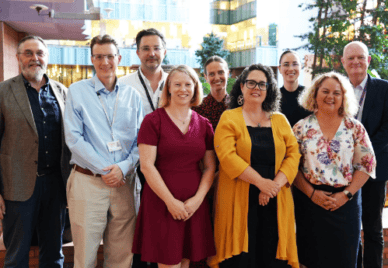
NCRIS Facilities Showcase Cutting-Edge Services for Health Researchers and Industry
Exploreabout NCRIS Facilities Showcase Cutting-Edge Services for Health Researchers and Industry
Last week Seven Bridges, an industry-leading bioinformatics ecosystem provider, created international interest in a multinational genomic cancer research project that the Australian Research Data Commons (ARDC) is involved in.
Seven Bridges’ announcement highlighted how our collaboration will help researchers better understand rare pediatric brain cancer subtypes and improve treatment for patients. We have partnered with Seven Bridges, The Gabriella Miller Kids First Data Resource Center (Kids First DRC), ZERO Childhood Cancer (ZERO), the Children’s Brain Tumor Tissue Consortium (CBTTC) and the Australian BioCommons, to create an internationally federated computational infrastructure that enables the harmonisation of pediatric cancer data from ZERO Australia with the extensive genomic datasets from CBTTC and Kids First DRC. That is to say, these datasets can be organised and transformed using coherent and reliable methods and in ways that ensure they can be trusted and analysed meaningfully.
The team has been working hard to expand CAVATICA, a cloud-based platform for collaboratively accessing, sharing, and analysing childhood cancer data, to Amazon Web Services in Sydney and enable harmonisation of data. Earlier this year, we hosted a series of workshops and a webinar in Australia to boost local ability to leverage CAVATICA’s benefits.
The momentum to provide personalised treatment continues to build with the Australian Government, together with the Minderoo Foundation, announcing an additional $67 million to expand the ZERO program, last month. The program expansion will enable all Australian children and young adults diagnosed with cancer to access genomically guided, precision treatments through this world leading collaborative research and clinical program.
With the expansion of the ZERO program in Australia and the progress made by this international data-sharing collaboration between researchers in Australia and the United States, we look forward to sharing more exciting updates soon.
Subscribe to our newsletter and follow us on Twitter and LinkedIn to stay in touch and up to date on our activities and events.